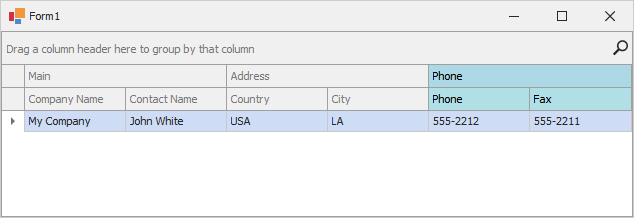BandedGridColumn Class
Represents an individual column in Banded Grid Views.
Namespace: DevExpress.XtraGrid.Views.BandedGrid
Assembly: DevExpress.XtraGrid.v24.2.dll
NuGet Packages: DevExpress.Win.Grid, DevExpress.Win.Navigation
#Declaration
public class BandedGridColumn :
GridColumn#Remarks
BandedGridColumn objects represent individual columns displayed in Banded Grid Views and Advanced Banded Grid Views. Both View types arrange columns into bands. So, the BandedGridColumn class introduces members used to bind columns to bands. Advanced Banded Grid Views allow custom column arrangement. Thus, the BandedGridColumn class introduces properties controlling column header and cell position and size. These are the BandedGridColumn.ColIndex, BandedGridColumn.RowIndex, BandedGridColumn.AutoFillDown and BandedGridColumn.RowCount properties. Note that these settings are not in effect for columns owned by a BandedGridView.
To display a column within a specific band in code, first assign the required band to the column’s BandedGridColumn.OwnerBand property. Then, specify the position of the column within the band. For BandedGridViews, use the GridBandColumnCollection.MoveTo method of the GridBand.Columns collection. For AdvBandedGridViews, call the AdvBandedGridView.SetColumnPosition method.
To temporarily hide a column from the View, use the GridColumn.Visible inherited property.
Available BandedGridColumn objects can be accessed via the BandedGridView.Columns property. To access columns owned by a specific band, use the band’s GridBand.Columns property.
#Example
This example shows how to create a GridControl, while presenting its underlying data using a banded grid format (BandedGridView). The example creates three bands (Main, Address and Phone), adds columns to the bands and customizes the background color for the third band and its columns.

using System;
using System.Collections.Generic;
using System.Windows.Forms;
using DevExpress.XtraEditors;
using DevExpress.XtraGrid;
using DevExpress.XtraGrid.Views.BandedGrid;
namespace DXApplication {
public partial class Form1 : XtraForm {
public Form1() {
InitializeComponent();
this.Load += Form1_Load;
}
private void Form1_Load(object sender, EventArgs e) {
GridControl gridControl1 = new GridControl() { Parent = this, Dock = DockStyle.Fill };
BandedGridView bandedGridView1 = new BandedGridView(gridControl1);
GridBand gridBandMain = new GridBand() { Caption = "Main", VisibleIndex = 0 };
GridBand gridBandAddress = new GridBand() { Caption = "Address", VisibleIndex = 1 };
GridBand gridBandPhone = new GridBand() { Caption = "Phone", VisibleIndex = 2 };
BandedGridColumn colCity = new BandedGridColumn() { FieldName = "City", Visible = true };
BandedGridColumn colCompanyName = new BandedGridColumn() { FieldName = "CompanyName", Visible = true };
BandedGridColumn colContactName = new BandedGridColumn() { FieldName = "ContactName", Visible = true };
BandedGridColumn colCountry = new BandedGridColumn() { FieldName = "Country", Visible = true };
BandedGridColumn colPhone = new BandedGridColumn() { FieldName = "Phone", Visible = true };
BandedGridColumn colFax = new BandedGridColumn() { FieldName = "Fax", Visible = true };
gridControl1.DataSource = new List<DataRecord>() {
new DataRecord(){ City = "LA", CompanyName = "My Company", ContactName = "John White",
Country = "USA", Fax = "555-2211", Phone = "555-2212" }
};
gridControl1.ViewCollection.Add(bandedGridView1);
gridControl1.MainView = bandedGridView1;
bandedGridView1.Bands.AddRange(new GridBand[] { gridBandMain, gridBandAddress, gridBandPhone });
bandedGridView1.Columns.AddRange(new BandedGridColumn[] { colCompanyName, colContactName, colCity, colCountry, colPhone, colFax });
colPhone.AppearanceCell.BackColor = System.Drawing.Color.PowderBlue;
colPhone.AppearanceCell.Options.UseBackColor = true;
colPhone.AppearanceHeader.BackColor = System.Drawing.Color.PowderBlue;
colPhone.AppearanceHeader.Options.UseBackColor = true;
colFax.AppearanceCell.BackColor = System.Drawing.Color.PowderBlue;
colFax.AppearanceCell.Options.UseBackColor = true;
colFax.AppearanceHeader.BackColor = System.Drawing.Color.PowderBlue;
colFax.AppearanceHeader.Options.UseBackColor = true;
gridBandMain.Columns.Add(colCompanyName);
gridBandMain.Columns.Add(colContactName);
gridBandAddress.Columns.Add(colCountry);
gridBandAddress.Columns.Add(colCity);
gridBandPhone.AppearanceHeader.BackColor = System.Drawing.Color.LightBlue;
gridBandPhone.AppearanceHeader.Options.UseBackColor = true;
gridBandPhone.Columns.Add(colPhone);
gridBandPhone.Columns.Add(colFax);
bandedGridView1.OptionsCustomization.AllowChangeColumnParent = false;
}
}
public class DataRecord {
public string CompanyName{ get; set; }
public string ContactName { get; set; }
public string City { get; set; }
public string Country { get; set; }
public string Phone { get; set; }
public string Fax { get; set; }
}
}